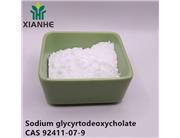Sodium Cholate Overview
Definition:
Sodium cholate is a bile salt formed from cholic acid and sodium. It is commonly used in biochemistry and pharmaceutical applications due to its surfactant and emulsifying properties.
Function:
Sodium cholate acts as an emulsifier, helping to break down fats into smaller droplets, aiding in digestion and the absorption of fat-soluble nutrients. It also has detergent-like properties, making it useful in breaking down cell membranes in laboratory procedures.
Applications:
· Pharmaceuticals: Used in drug formulations to improve the solubility and absorption of certain compounds, especially in bile acid-related treatments.
· Biochemical Research: Commonly employed in laboratory experiments for membrane disruption, protein solubilization, and enzyme studies.
· Cosmetics: Occasionally included in formulations as an emulsifying agent to help blend oil and water-based ingredients.


 China
China

